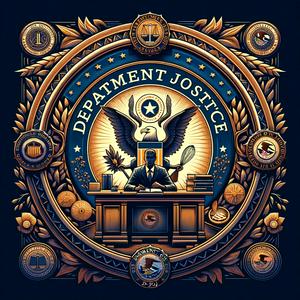Immigration Crackdown, Victim Support, and Corporate Compliance: DOJ Updates You Need to Know
Welcome to our podcast, where we dive into the latest news and developments from the Department of Justice. This week, we're focusing on a significant policy change that's making headlines. On January 21, 2025, the DOJ issued a new memo outlining major policy changes regarding immigration enforcement efforts. This sweeping initiative empowers prosecutors to take all steps necessary to protect the public and secure the American border, leading to unprecedented scrutiny that could impact law-abiding employers who hire immigrants or foreign nationals[2].The memo highlights a large increase in federal cases for immigration-related offenses, with a focus on criminal prosecutions and deportations. Prosecutors are now directed to charge the most serious, readily provable offense, and the DOJ will closely monitor enforcement efforts, tracking investigations, arrests, convictions, and resulting sentences or removals. This move could ensnare unsuspecting employers, emphasizing the need for strict compliance with immigration laws.In other news, the DOJ has been active in various areas. The Office of Justice Programs announced that it will accept applications for financial assistance from eligible victims of crimes involving child sexual abuse material, providing crucial support to those affected[1]. Additionally, the Bureau of Justice Statistics released several reports, including "Time Served in State Prison, 2018 — Supplemental Tables" and "Juveniles Charged in Adult Criminal Courts, 2014," offering valuable insights into the criminal justice system[1].The DOJ has also underscored the importance of corporate compliance programs, with recent updates demanding new attention to AI risk. This means that businesses must develop comprehensive plans to address gaps in their compliance programs, ensuring they are actively working to improve their controls and can demonstrate this to prosecutors[3].On a different front, the Special Counsel's report on the investigations into former President Donald J. Trump was released, detailing the findings on efforts to interfere with the lawful transfer of power following the 2020 presidential election[5]. This report highlights the DOJ's commitment to independence and accountability in sensitive matters.These developments have significant impacts on American citizens, businesses, and state and local governments. For employers, the new immigration enforcement efforts mean increased scrutiny and potential legal consequences. For victims of child sexual abuse, the financial assistance program offers much-needed support. And for businesses, the emphasis on corporate compliance programs underscores the need for robust internal controls.As we look ahead, it's important to stay informed about these changes and their implications. Citizens can engage by staying updated on DOJ news and providing input on policy changes when possible. For more information, visit the DOJ's website and follow reputable news sources.In closing, the DOJ's latest news and developments underscore the department's commitment to justice and public safety. Whether it's through new policy initiatives, support for victims, or emphasis on corporate compliance, these changes have real-world impacts. Stay tuned for more updates, and thank you for joining us today.

